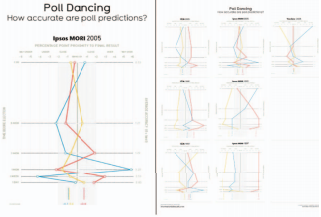Visualization Rhetoric: Framing Effects in Narrative Visualization
IEEE Trans. Visualization & Comp. Graphics (Proc. INFOVIS) 2011Abstract
Narrative visualizations combine conventions of communicative and exploratory information visualization to convey an intended story. We demonstrate visualization rhetoric as an analytical framework for understanding how design techniques that prioritize particular interpretations in visualizations that “tell a story” can significantly affect end-user interpretation. We draw a parallel between narrative visualization interpretation and evidence from framing studies in political messaging, decision-making, and literary studies. Devices for understanding the rhetorical nature of narrative information visualizations are presented, informed by the rigorous application of concepts from critical theory, semiotics, journalism, and political theory. We draw attention to how design tactics represent additions or omissions of information at various levels—the data, visual representation, textual annotations, and interactivity—and how visualizations denote and connote phenomena with reference to unstated viewing conventions and codes. Classes of rhetorical techniques identified via a systematic analysis of recent narrative visualizations are presented, and characterized according to their rhetorical contribution to the visualization. We describe how designers and researchers can benefit from the potentially positive aspects of visualization rhetoric in designing engaging, layered narrative visualizations and how our framework can shed light on how a visualization design prioritizes specific interpretations. We identify areas where future inquiry into visualization rhetoric can improve understanding of visualization interpretation.
Citation
BibTeX
@article{vis-rhetoric-2011,
title = {Visualization Rhetoric: Framing Effects in Narrative Visualization},
author = {Hullman, Jessica and Diakopoulos, Nick},
year = 2011,
journal = {IEEE Transactions on Visualization and Computer Graphics},
volume = 17,
number = 12,
pages = {2231--2240},
doi = {10.1109/TVCG.2011.255}
}

